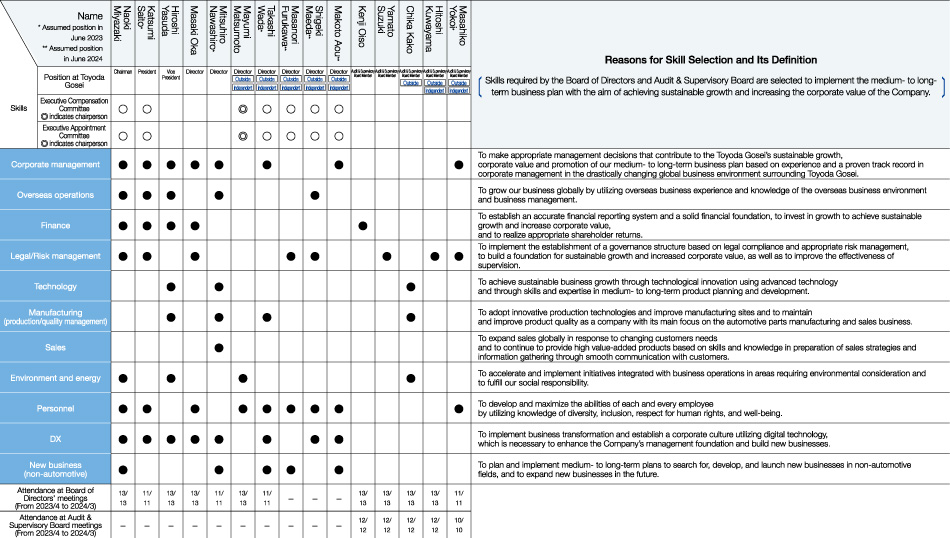Establishing and operating transparent
management systems to further enhance
Group-wide corporate governance
To continue to be a trusted company, we are working to enhance corporate governance throughout the Toyoda Gosei Group.
We are improving the appropriateness and efficiency of our operations by developing and operating internal control systems to create a fair and transparent corporate governance system, while we ensure its effectiveness through management supervision and audits by outside directors and outside Audit & Supervisory Board members. Furthermore, we are also implementing legal compliance, corporate ethics, and risk management activities.
Corporate Governance
Basic Philosophy
We view the enhancement and enhancing of corporate governance with the aim of ensuring sound and efficient corporate management to be crucial in achieving sustainable growth. Based on this, we are building and maintaining fair and transparent management systems and organizational systems that can respond effectively to a changing business environment.
Additionally, Toyoda Gosei pursues consummate corporate governance by voluntarily implementing a range of policies in accord with the letter and spirit of the ideals and principles in Japan’s Corporate Governance Code, formulated by the Financial Services Agency and the Tokyo Stock Exchange.
Corporate Governance Report
Corporate Governance Structure
Corporate Governance System
Toyoda Gosei has chosen an audit and supervisory board company and set up the Shareholders’ Meeting, Board of Directors, Audit & Supervisory Board, and accounting auditors as statutory entities. We have also put in place internal auditors and other internal control systems including internal audits. The Board of Directors consists of ten directors and holds regular monthly meetings (extraordinary meetings held as needed), where matters prescribed by law or in the Articles of Incorporation and important matters such as strategies related to corporate management are reported and resolved.
A system of corporate officers is used to speed up decision-making and business execution. Furthermore, by introducing the Chief Officer System in June 2023 and transferring some of the president’s authority and responsibilities to the Chief Officers, we will cross over the boundaries of business and regional operation bases to manage priority functions on a global basis, thereby realizing highly strategic business execution and accelerating the speed of management. Additionally, in June 2024, we delegated part of the Board of Directors’ decision-making authority to the executive side. Through this, we aim to enrich the discussion of management strategies in the Board of Directors, establish new Special Execution Meetings on important matters, and enhance execution speed and autonomous management.
Moreover, for important business matters, decision-making meetings on important matters, General Managers’ Council and Management Council meetings are held monthly. Functional meetings and committee meetings relevant to key areas such as safety, quality, environment, technology, revenue, and personnel are also held as needed to ensure appropriate management decisions.
At the annual Shareholders’ Meeting, held on June 14, 2024, Mayumi Matsumoto, Takashi Wada, Masanori Furukawa, Shigeki Maeda, and Makoto Aou were appointed as outside directors.
For outside Audit & Supervisory Board members, we selected Chika Kako as a new member, joining incumbent members Hitoshi Kuwayama and Masahiko Yokoi, for a total of three outside auditors.
The Audit & Supervisory Board consists of five members and holds regular meetings. Members also attend important meetings such as Board of Directors’ meetings and audit each department and subsidiary, through which they fulfill their function of auditing corporate management. Accounting auditors are external auditors who combine auditing functions with a commitment to ensuring an independent and fair auditing system.
The Company uses the current system because audit, supervisory, and execution functions are well coordinated with each other under this structure, with legality and efficiency of the Company’s decision-making and business execution sufficiently ensured.
Also, in order to strengthen the supervisory function of the Board of Directors and to increase the objectivity and transparency of the decision-making process, we have established the Executive Appointment Committee and Executive Compensation Committee under the Board of Directors as non-mandatory advisory committees.
Internal Control Systems
In accordance with the provisions of Japan’s Companies Act, Toyoda Gosei has formulated a Basic Policy on Establishing Internal Controls. Under this policy, we are striving to ensure appropriate operations by establishing internal control systems, which help us deliberate important matters, establish related rules and guidelines, and handle internal audits, compliance and risk management. Every year, the Board of Directors checks the status of establishment and operation of internal controls in an ongoing initiative to improve and reinforce them. In April 2023, we revised the basic policy with the aim of enhancing and operating internal controls, including those for subsidiary management. In addition, we established a Regulatory Compliance Office in June 2023 to further reinforce our regulatory compliance framework.
Regarding group management, to cultivate a healthy internal controls environment at Toyoda Gosei and its subsidiaries, all Group companies share its management philosophy. The Toyoda Gosei Group Charter for Business Ethics, a shared guideline for compliance, has also been instituted and expanded to subsidiaries. While respecting the independence of subsidiary management, we receive regular business reports from subsidiaries and set up systems to confirm the propriety and legality of subsidiaries’ businesses through advance approval reports. We also send non-executive directors and Audit & Supervisory Board members to key subsidiaries in a system to monitor and act as a check on their business execution.
■Corporate Governance System
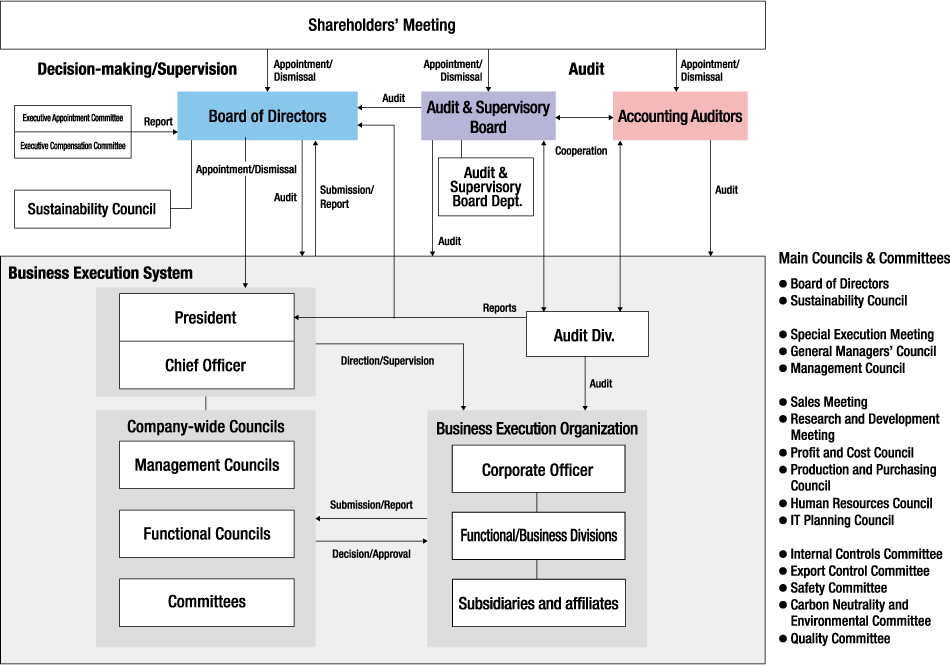
Executive Compensation Committee and Executive Appointment Committee
Toyoda Gosei’s Executive Compensation Committee and Executive Appointment Committee are composed of members of which more than half are outside directors.
The chair of both committees is appointed from outside directors to further enhance transparency and objectivity.
■Committees roles and composition
| Name | Role | Members | Attendance (FY2023) |
|---|---|---|---|
| Executive Compensation Committee (Number of meetings in FY2023: 1) |
Deliberates and reports on the compensation system for directors and their individual compensation (restricted stock-based compensation, etc.) |
Naoki Miyazaki, chairman Katsumi Saito, president Mayumi Matsumoto, outside director (chairperson#) Takashi Wada, outside director Masanori Furukawa, outside director* Shigeki Maeda, outside director* Makoto Aou, outside director* |
1/1 1/1 1/1 1/1 - - - |
| Executive Appointment Committee (Number of meetings in FY2023: 1) |
Deliberates and reports on proposals regarding the appointment and dismissal of directors and Audit & Supervisory Board members (appointment of the president, etc.) | Naoki Miyazaki, chairman Katsumi Saito, president Mayumi Matsumoto, outside director (chairperson#) Takashi Wada, outside director Masanori Furukawa, outside director* Shigeki Maeda, outside director* Makoto Aou, outside director* |
1/1 1/1 1/1 1/1 - - - |
# Appointed in June 2024 * Assumed position in June 2024
Sustainability Council
In November 2021, we established our Sustainability Council with the aim of achieving sustainable corporate growth, improving corporate value, and contributing to the sustainable development of society. In this Council, we work diligently to discuss and decide on key action items related to sustainability and confirm how the initiatives are progressing with a sense of urgency. Chaired by the president, the Council consists of all directors, including those from outside the company, Audit & Supervisory Board members, and general managers of divisions, including those in overseas regions, and implements balanced sustainability measures with a high degree of objectivity and transparency.
| Frequency | Generally meets twice yearly |
|---|---|
| Chairperson | President |
| Members | All directors and Audit & Supervisory Board members (including outside directors and Audit & Supervisory Board members), general managers of divisions and overseas regional operation bases |
| Main Agenda |
|
Policies and Procedures to Appoint and Remove Senior Officers and Nominate Candidates for Directors and Audit & Supervisory Board Members
Nominations of candidates for directors and Audit & Supervisory Board members are made after deliberation and reporting by the Executive Appointment Committee, followed by a resolution of the Board of Directors and a subsequent Shareholders’ Meeting.
The nomination policy for senior officer and director candidates is based on the candidate’s personal magnetism in terms of their ability to make accurate and prompt decisions after taking into account the balance of knowledge, experience, and capabilities of the management team and the Board of Directors as a whole.
The candidates are comprehensively nominated and appointed on the basis of their ability to fully comply with laws and corporate ethics.
Skills Matrix
- The following table shows each director’s and Audit & Supervisory Board (ASB) member’s expected field of specialty based on their past experience.
- The composition of our Board of Directors and Audit & Supervisory Board (ASB) as a whole takes into consideration the balance of knowledge, experience, and abilities, as well as diversity and number of members.
* Click to enlarge
Changes in Numbers of Directors and Audit & Supervisory Board Members
In 2012, Toyoda Gosei adopted a system of corporate officers and downsized its Board of Directors to nine directors from 23 as of 2011. It appointed its first outside director in 2015.
The Board currently comprises ten directors, five of whom are outside directors, accounting for 50% of the total number of directors. Two of the outside directors are women. The outside director appointments have increased the Board’s objectivity and diversity.
■No. of Directors
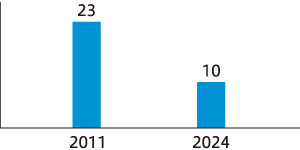
■No. of Audit & Supervisory Board (ASB) members
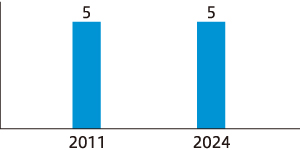
■Outside Director Ratio
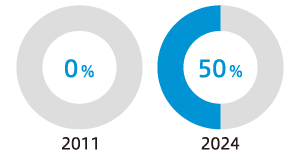
■Outside ASB Member Ratio
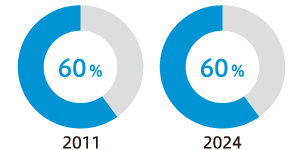
■Female Director Ratio
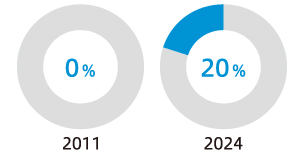
■Female ASB Member Ratio
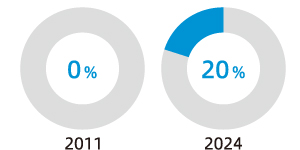
■Major Initiatives to Strengthen the Governance Structure
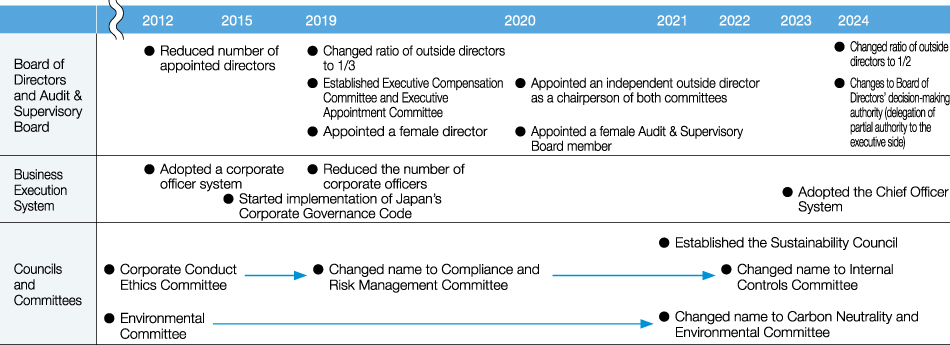
Board of Directors
The Board of Directors deliberates from many different perspectives on the direction of management, including management and business strategies, then reports, discusses and makes resolutions on progress as necessary. In such a way, the Board supervises from a number of different viewpoints on whether management strategies are being executed appropriately. To enrich strategy discussions and ensure ample time for in-depth debate, we established Special Execution Meetings on important matters on the executive side and delegated certain authorities. In addition to enhancing the Company’s internal control system and risk management system, in recent years the Board of Directors has been working to achieve sustainable corporate growth amid a chaotic business environment, including changes in market conditions, economic security, geopolitical risks, and worsening environmental problems.
■Main Agenda Items and Reports by the Board of Directors in FY2023
| Theme | Main Agenda Items and Reports |
|---|---|
| Management / Business strategies |
|
| Corporate |
|
| Investment and Loan Projects |
|
■Number of Agenda Items and Reports by the Board of Directors in FY2023
| 1Q | 2Q | 3Q | 4Q | Total | |
|---|---|---|---|---|---|
| Agenda Items | 15 | 7 | 12 | 8 | 42 |
| Reports | 13 | 7 | 12 | 11 | 43 |
| Total | 28 | 14 | 24 | 19 | 85 |
Evaluation of the Effectiveness of the Board of Directors
Effective functioning of corporate governance is essential for the Company’s sustainable growth, to enhance corporate value, and to contribute to the sustainable development of society. Therefore, to ensure the effectiveness of the roles and responsibilities of the Board of Directors, evaluations and opinions are heard every year from members of the Board. The Board of Directors then analyzes, evaluates, and deliberates on measures for improvement. In FY2023, debriefings with all eight directors and all five Audit & Supervisory Board members were conducted to assess their performance. As a result, Toyoda Gosei found no material deficiencies across any of its assessments and concluded that the Board continues to function effectively.
As in the previous year, the Board received high ratings for its openness and candid discussions and support for outside officers. We believe that questions and opinions from outside officers are important for our decision-making process, and we will continue these efforts.
Regarding the long-standing issue of “medium- to long-term policy discussions,” in FY2023, we enhanced communication outside the Board of Directors to deepen understanding among outside directors and outside Audit & Supervisory Board members. We supplemented information and understanding on our status, challenges, and strategies through activities such as outside executive liaison meetings, pre-meeting explanations, and site visits.
As a result, we received evaluations indicating a positive contribution to deliberations and decision-making within the Board.
However, there were opinions that further expansion of strategic discussions was necessary. Therefore, we advanced the delegation of authority to the executive side, streamlined agenda topics for the Board of Directors, and secured time for long-term and strategic discussions to further improve the effectiveness of the Board of Directors.
Through these efforts, we will work to further improve the effectiveness of the Board in the current fiscal year.
■Board Effectiveness Evaluation Process
- Evaluation Method
- Interview: Eight directors and five Audit & Supervisory Board members
Evaluation process: Analysis of interviews and debriefing results to ensure anonymity
- Debriefing Items (Main Items)
-
- Roles and responsibilities of directors
- Oversight function of the Board
- Deliberations within the Board
- Support for outside officers
■FY2023 Board Effectiveness Evaluation Results
| Issues Identified | Measures |
|---|---|
| Expansion of strategic discussions on business, regional, and functional matters | Delegating authority to the executive side and narrowing down agenda topics to allow sufficient time for discussion |
| Enhancing the effectiveness of the succession plan | Creating opportunities for interaction with senior executives and executives who are future board candidates |
| Consideration of the executive compensation system (especially evaluation criteria) | Reviewing executive compensation systems to address social issues (including ESG and sustainability indicators) |
■Issues Evaluated in FY2022 for Board Effectiveness and Status of Initiatives in FY2023
| FY2022 Effectiveness Evaluation Results (Issues) | Initiatives Situation in FY2023 |
|---|---|
| Enhancing discussions on medium- to longterm plans and future visions | Enhance discussion of the 2030 Business Plan and its initiatives for medium- to long-term management strategy and corporate value enhancement (Issues Identified in FY2023, First Item) |
| Providing information to outside officers |
|
| Opportunities for exchange of opinions among outside officers | Plan opportunities for exchange of opinions among outside officers to further improve governance |
| Ensuring further diversity of the Board | Continue to select candidates with diversity in mind based on the skill matrix and to treat this as an ongoing issue for consideration |
Expected Roles of and Support for Outside Directors
We have appointed five outside directors, each with a wealth of experience and keen insight, primarily in areas such as corporate management, manufacturing, environment and energy, international affairs, public administration, advanced IT, DX, new business creation, talent development, and organizational management. To further diversify the Board and promote women’s participation, we appointed Makoto Aou, our second female director, following Mayumi Matsumoto, our first female director.
The five adeptly fulfill monitoring and advisory roles in addition to actively participating in Board discussions. In their monitoring role, they receive support in the form of departmental briefings on business operations and challenges and direct access to frontline operations through on-site visits to domestic and overseas subsidiaries to better understand the actual state of operations. Additionally, they are briefed in advance on the content and background of resolutions to be voted on at Board meetings to facilitate sound decision-making.
At the same time, the outside directors advise on management and business challenges. Advisory opportunities include regularly scheduled liaison meetings attended by all outside directors and outside Audit & Supervisory Board members, each of whom attends various other meetings also, including the Sustainability Council, Carbon Neutrality and Environmental Committee meetings.
Outside Directors and Outside Audit & Supervisory Board Members
At the annual Shareholders’ Meeting, held on June 14, 2024, Mayumi Matsumoto, Takashi Wada, Masanori Furukawa, Shigeki Maeda, and Makoto Aou were appointed as outside directors.
For outside Audit & Supervisory Board members, we reappointed Chika Kako, who joins incumbent members Hitoshi Kuwayama and Masahiko Yokoi for a total of three outside auditors.
■Election of Outside Directors and Outside Audit & Supervisory Board Members
| Appointment | Name | Independent Director/Auditor | Reason for Appointment |
|---|---|---|---|
| Outside directors | Mayumi Matsumoto | ○ | To benefit from her management oversight and advice based on her extensive experience and high-level insight as a news anchor and researcher in the broad fields of social issues, environment, and energy in the management of Toyoda Gosei. Ms. Matsumoto has been designated as an independent auditor because she meets the requisite criteria and is deemed free of potential conflicts of interest with regular shareholders. |
| Takashi Wada | ○ | To benefit from his management oversight and advice based on his extensive experience and expertise in the management of manufacturing companies over many years. Mr. Wada has been designated as an independent auditor because he meets the requisite criteria and is deemed free of potential conflicts of interest with regular shareholders. |
|
| Masanori Furukawa | ○ | Masanori Furukawa, with a background as a city council member and mayor, has devoted nine terms (36 years) to local government and municipal administration. His extensive experience and high level of insight are expected to provide valuable oversight and advice for the Company’s management. Mr. Furukawa has been designated as an independent auditor because he meets the requisite criteria and is deemed free of potential conflicts of interest with regular shareholders. | |
| Shigeki Maeda | ○ | Shigeki Maeda brings rich international experience from years of overseas assignments and a broad network within government agencies and the business world, supported by his role as a JETRO board member overseeing organizational operations and management. Drawing on this wealth of experience and deep insight, he provides supervision and advice on our Company’s management. Mr. Maeda has been designated as an independent auditor because he meets the requisite criteria and is deemed free of potential conflicts of interest with regular shareholders. | |
| Makoto Aou | ○ | Makoto Aou has an entrepreneurial and managerial background in advanced IT business, as well as experience supporting companies in new business creation, DX, and diversity promotion. Her extensive experience and insight are expected to contribute valuable oversight and advice to the Company’s management. Ms. Aou has been designated as an independent auditor because she meets the requisite criteria and is deemed free of potential conflicts of interest with regular shareholders. | |
| Outside Audit & Supervisory Board members | Chika Kako | To incorporate into Toyoda Gosei’s audits her wealth of experience and keen insight gained from her career at Toyota Motor Corporation, where she served mainly in vehicle development and materials development roles and was involved in management as a managing officer. | |
| Hitoshi Kuwayama | ○ | To incorporate his extensive experience and deep insight as a lawyer in the auditing of Toyoda Gosei. Mr. Kuwayama has been designated as an independent auditor because he meets the requisite criteria and is deemed free of potential conflicts of interest with regular shareholders. |
|
| Masahiko Yokoi | ○ | To incorporate his extensive experience and deep insight as a manager in the auditing of Toyoda Gosei. Mr. Yokoi has been designated as an independent auditor because he meets the requisite criteria and is deemed free of potential conflicts of interest with regular shareholders. |
Outside Officer dialogue
New outside directors Takashi Wada, appointed in June 2023, and Shigeki Maeda, appointed in June 2024, shared their candid perspectives on our ongoing corporate governance reforms and evaluations of the 2030 Business Plan, along with the key issues they have identified.
Executive Compensation
Directors’ compensation consists of monthly fixed compensation and performance-based compensation in the form of cash bonuses (short-term incentive) and stock-based compensation (long-term incentive) based on the idea that directors should be appropriately incentivized to pursue sustained growth in Toyoda Gosei’s value. Directors’ compensation is split roughly 70:20:10 among monthly compensation, cash bonuses, and stock-based compensation, respectively.
Monthly compensation is set at a fixed amount that reflects the recipient’s job responsibilities and experience as well as compensation levels at other companies. Cash bonuses are based primarily on fiscal yearly consolidated operating profit. Secondary variables that factor into their determination include the degree to which fiscal yearly plans are attained, employees’ bonus levels, bonus levels at other companies, medium- to long-term earnings, previously paid bonus amounts, and contributions to ESG management. Stock-based compensation is intended as an incentive to pursue sustained growth in Toyoda Gosei’s value. It is paid in the form of restricted stock-based compensation to promote greater sharing of value with shareholders.
Directors’ aggregate annual cash compensation (monthly compensation plus bonuses) is capped at 650 million yen (outside directors’ share included). Directors’ aggregate annual restricted stock-based compensation is capped at 100 million yen (outside directors are not eligible for restricted stock-based compensation). The compensation caps were approved at the annual Shareholders’ Meeting on June 12, 2020. The total compensation for outside directors has been revised to a maximum annual limit of 100 million yen, as resolved at the June 14, 2024, Shareholders’ Meeting.
Outside directors and Audit & Supervisory Board members receive only fixed monthly compensation because their role is to oversee and audit management from an independent vantage point.
Individual directors’ compensation is set in accord with the above policies following a fair and transparent review/reporting process by the majority-independent Executive Compensation Committee.
At Executive Compensation Committee meetings, outside directors have made suggestions about further enlarging the incentive element of director compensation by, e.g., adjusting compensation to reflect the extent of directors’ respective environmental contributions.
■Director Compensation Scheme
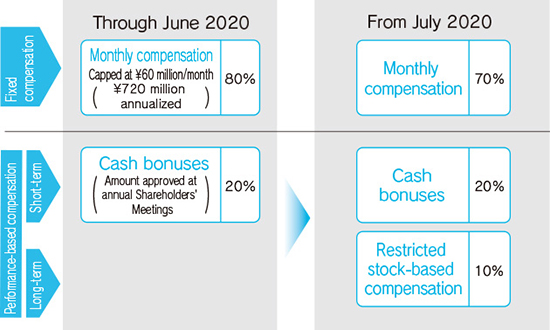
■Total Compensation for Each Officer Class, Total by Each Type of Compensation, and Number of Officers Receiving the Compensation
| Officer Class | Total Executive Compensation (Millions of yen) |
Total Amount by Type of Compensation (Millions of yen) | Number of Subject Officers (People) |
||
|---|---|---|---|---|---|
| Fixed Compensation |
Performance-based Compensation |
Non-cash Compensation |
|||
| Monthly Compensation |
Cash Bonuses |
Stock-based Compensation |
|||
| Directors (excluding outside directors) |
327 | 196 | 106 | 23 | 8 |
| Audit & Supervisory Board members (excluding outside members) |
78 | 78 | - | - | 2 |
| Outside officers | 69 | 69 | - | - | 8 |
*Bonuses are the provisions for FY2023
Internal Audits, Audit & Supervisory Board Membersʼ Audits, and Accounting Audits
We have set up the Audit Division to handle internal audits. With the aims of achieving financial objectives and preventing misconduct and mistakes, internal audits are conducted across the overall business (including audits of functional departments) based on an internal auditing plan approved by management at the beginning of each term.
The results of internal audits are reported to management, and audited departments are given recommendations for improvements based on the audit results. The effectiveness of internal audits is increased by checking their improvement plans and results.
Each Audit & Supervisory Board member follows the auditing policy and audit plan established by the Audit & Supervisory Board when investigating the Company and subsidiaries. They attend the meetings of important deliberative bodies and committees including the Board of Directors, Special Execution Meeting on Important Matters, General Managers’ Council, and Management Council, listen to reports on business from directors and others, inspect financial statements and other important documents, and conduct on-site audits of offices and subsidiaries to audit the performance of duties by directors from the perspectives of ensuring legality and appropriateness, protecting assets and rights, and preventing loss. Moreover, a special department has been established to assist the Audit & Supervisory Board members’ audits.
The certified public accountants who performed the FY2023 accounting audit of Toyoda Gosei were Satoko Nakatani and Kosaku Kawahara of PricewaterhouseCoopers Japan LLC.
Audit & Supervisory Board members, internal auditing department personnel, and accounting auditors regularly meet to confirm their respective auditing systems, auditing policy, auditing plans, implementation status, and audit results. They cooperate in performing efficient and effective audits, contacting each other as needed to exchange ideas and share information.

